Taking Steps Vermont
Who's You Person? What's Your Plan?

The Taking Steps program offers a stepwise approach to using the available tools (advance directives and DNR/COLST orders) for documenting your advance care plan.
Documenting Your Healthcare Decisions
Whether you’re 18 or 81, sudden accident or illness can happen at any time. It’s important to think about and plan for future medical decisions in case you are unable to speak for yourself. Advance Care Planning (ACP) is a set of simple steps you can take to ensure your healthcare providers and surrogate decision-makers know what matters to you.
In Vermont, many options are available for advance directive forms. The form that you use will depend on what kind of information you want to document in your advance directive.
Start Taking Steps
STEP 1: WHO’S YOUR PERSON?
For adults 18 years of age or older
Complete an advance directive to appoint a Health Care Agent, also known as a health care proxy or power of attorney for health care, to make medical decisions if you are unable to speak for yourself. If you want to appoint a health care agent AND describe your treatment preferences, go to Step 2.
Advance Directive “Agent Only” Form (Appointment a Health Care Agent)
STEP 2: WHAT’S YOUR PLAN?
For adults with chronic illness or those seeking to give more specific information about their values and healthcare preferences
Complete an advance directive to appoint a health care agent and give detailed information about your health care goals and treatment priorities to provide guidance for your family, friends and health care providers in times of critical illness or serious injury.
STEP 3: ARE THERE LIMITS?
For individuals who are seriously ill or dying, or who are certain they would not want life-prolonging interventions
Consider talking with your clinician about Medical Orders to limit the use of life-sustaining treatment at the end-of-life. An advance directive may not be enough to ensure that a preference to limit life-sustaining treatment will be honored in all settings.
What is the difference between an advance directive and a DNR/COLST order?
An advance directive is a legal document completed by an individual who is capable of making their own decisions. These are preference-based documents that will guide care and treatment if the individual is not able to speak for themselves. In your advance directive, you can appoint a healthcare agent to speak for you and describe your treatment preferences. Advance directives are not actionable for emergency first responders because they are too long and detailed to be used in an rescue scenario.
- Advance directives can be completed by any individual with decision-making capacity, without consulting with a physician or an attorney.
A DNR/COLST order is a portable medical order created through a shared decision-making process between a clinician (MD, DO, APRN, PA) and a patient. These documents require informed consent, will guide the current treatment plan, and are legally recognized by all medical providers, including emergency first responders. Consent for a DNR/COLST can be provided by someone other than the patient if the patient lacks capacity.
- DNR/COLST orders are medical orders that must be completed by a clinician after an informed consent conversation with the patient or their surrogate. You must speak with a clinician (MD, DO, APRN, PA) to obtain a valid DNR/COLST order.
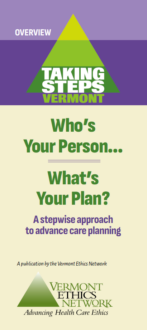 Taking Steps Overview Brochure
Taking Steps Overview Brochure
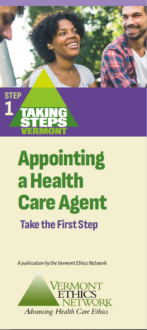 Step 1 Brochure: Appointing a Health Care Agent
Step 1 Brochure: Appointing a Health Care Agent
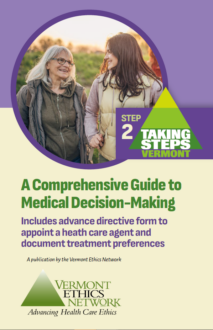 Step 2 Booklet: A Comprehensive Guide to Medical Decision-Making
Step 2 Booklet: A Comprehensive Guide to Medical Decision-Making
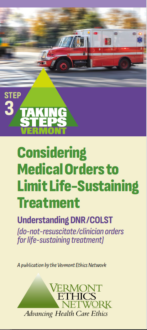 Step 3 Brochure: Considering Medical Orders to Limit Life-Sustaining Treatment
Step 3 Brochure: Considering Medical Orders to Limit Life-Sustaining Treatment
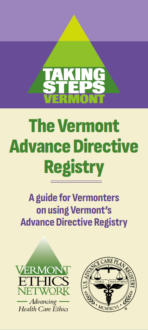 Vermont Advance Directive Registry Brochure
Vermont Advance Directive Registry Brochure